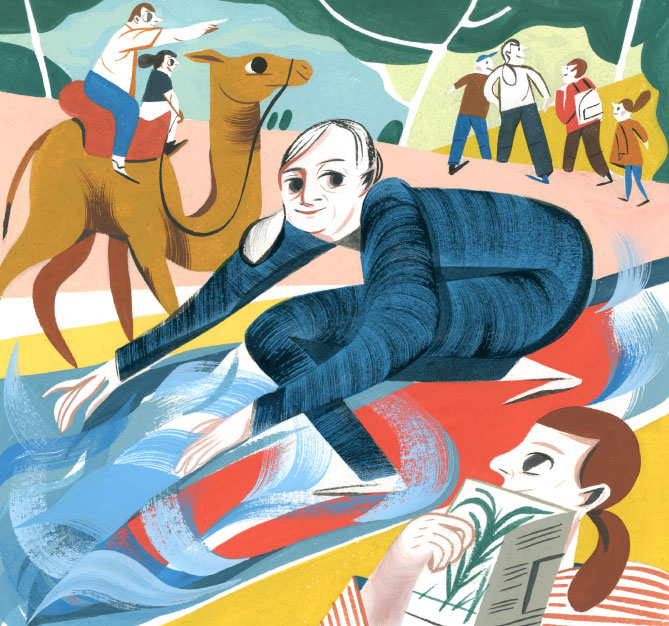You see them all over the world, jogging, hiking, paddling, surfing and mountain climbing. And no, we’re not talking about athletes here. We’re talking grandparents. The generation once known as the “blue rinse set” is now not only active, but affluent. And there is nothing they like more than to spend their reserves of leisure time, money and energy than with their extended family.
According to the National Leisure Travel Monitor, more than a third of all grandparents have been on vacation with their grandchildren. And children are
all for it. A study by the marketing firm Ypartnership confirms that 60 per cent
of children between the ages of six and 17 said they would like to travel with
their grandparents – and some even said they would prefer to leave their parents
at home.
As a result, travel agencies such as Boston-based Road Scholar now offer extensive holiday options for multigenerational families, including special programs that cater only to grandparents and their grandchildren. At the top of the list, they say, are hiking holidays in the National Parks. “Our clients want to hike, surf, bike and balloon in places like Arizona and Utah,” says manager Andre Purdy. European trips and cruises are also popular, he says, particularly those offering excursions that allow the younger generation to let off steam on land, while their grandparents relax on board.
The trend for multigenerational travel is yet another by-product of ageing baby boomers, says international travel brand consultant Sarah Miller. “The greatest luxury is time well spent,” she says. “Grandparents might have a wonderful memory from the holiday, but the hotels need the grandchildren to remember it too, so that when they grow up, they want to recreate something similar with their own family.”
Which is why hotels all over the world are rapidly adjusting to the trend. “Instead of having just rooms, hotels now have villas which an entire extended family might share,” says Miller. “They are also pushing their footprints beyond their own walls and into the city, by offering shopping excursions, gastronomic tours, cooking classes and art classes.” St. Regis has been at the forefront of this trend with its Family Traditions at St. Regis program. Large hotels in exotic locations that offer a mix of culture, activities and relaxation – as The St. Regis Abu Dhabi does – are particularly popular with groups whose ages vary. “While one member of a family may feel energetic and go on an excursion, another might want to enjoy time at the beach,” says Laila Rihawi, the hotel’s public relations manager. “There may be one day where they go on an excursion together, say to the Empty Quarter and the Sheikh Zayed Grand Mosque. But the next the grandkids and grandparents might go on their own to Yas Island’s water park and Ferrari World, or go on a Big Bus Tour.”
The three-bedroomed Abu Dhabi Super Suite, with staff quarters and a 14-seat dining room, is often booked by extended families, many of whom travel with nannies. Favorite destinations include places that sleep large groups and have spaces set aside for large-scale parties or entertainment, says Deborah Bigley, a specialist in organizing big group and multi-activity vacations. “Spaces need to be big enough for everyone to have their own independence and yet still be able to come together for dinners, which might be prepared by a chef one night, and on another by the families themselves.”
Helene Lorentzen, a Palm Beach-based consultant and mother of three boys, says that exotic destinations are popular, too. Last year, she brought together her extended family on an island in south-east Asia. “We all had our own enormous rooms, which were very private, as well as a big area where we could all gather. Because the staff were amazing, too, we never had to worry about logistics.”
Her mother – in her eighties – not only enjoyed the reunion, but joined in on all the activities. “Every one of us went for a surfing lesson – and nothing makes a grandson prouder than a surfing grandmother, even if all she did was ride the wave lying down,” says Lorentzen. “And a morning trek was organized for us though the rice paddies to a remote lunch spot, where my sister got engaged.” Although the aim of many vacations is just to bring together families, a large number are organized to celebrate a specific milestone. According to the
Travel Industry Association of America, more than three-quarters of travellers
have planned a vacation around a celebration such as a birthday, anniversary
and wedding.
Marie Divine, a New York-based mother of three, recently returned from a multigenerational visit to Vietnam. “The purpose was to return to the country where I was born [Divine was a diplomat’s daughter] with my husband and children – and then we thought, why not ask my [widowed] mother along as it was an important place in her life, too.” Divine planned the entire two-week trip with great precision. “When you have all age groups, you have to plan carefully, especially if you’re moving around,” she says. She mapped a daily list of activities that catered to all age groups, and hired a minivan to ferry everyone around. “This was a critical plus. Though we were moving around, we always settled back into the minivan and chatted about what we just experienced,” she says.
More than anything, it is these chats, she believes, that will always be remembered by her children. “Unlike other family occasions I have been to, like big celebration lunches, a trip is very different. It’s an activity that can be shared, and unlike golf or tennis or skiing which require stamina, all you have to be is present to take part.” And a trip, she adds, is a wonderful time for generations to get to know each other again more intimately – and learn more about their family history. “In our very anonymous world we are increasingly fascinated by our own families and their mythology. And kids no longer think that adults are square – partly because we all do and share so much.”
Her advice to anyone thinking of a similar adventure is to consider pace. “Some people move faster than others. A 15-year-old might decide a morning of sightseeing is enough, and need afternoons off. People should be able to drop out of an activity without feeling they are letting anyone down.” I know from experience that children really do savor these experiences. My 19-year-old son Ivan, now a college freshman, remembers a holiday we took with my parents eight years ago to Bermuda (the year before my mother died) with great affection. “There’s a short window in a kid’s life when he or she doesn’t realize he is different from his mother. He just thinks he’s just another part of this person
that laughs and summons food from nowhere and is warm,” he says. “The family holiday, when it goes right, restores that period. While a lone holiday can
provide a masculine re-affirmation, and a couples’ holiday can be passionate,
an inter-generational holiday is incredibly calming. Leaving your everyday circumstances and returning to the family fold can trick you into thinking you’re
a blissful baby.”



